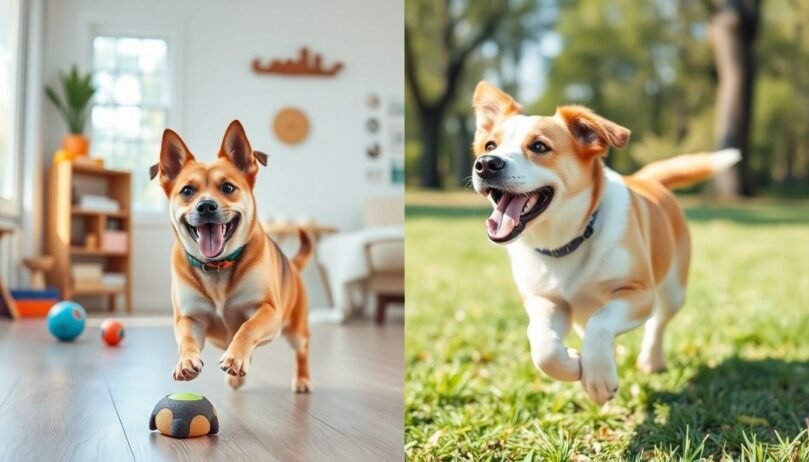How to Keep Your Dog Active: Fun Indoor and Outdoor Activities
- 27 January 2025
- BuyAPet Editorial Team
- All Dogs, Dog Health
How to Keep Your Dog Active: Fun Indoor and Outdoor Activities 🐶
Boost your dog’s health, behavior, and happiness with easy, engaging activities—rain or shine.
Did you know? Over 50% of dogs in the US are overweight or obese. Inactivity can lead to diabetes, joint issues, and behavior problems. Regular exercise supports a healthy weight, sharpens the mind, and boosts mood.
Physical and mental stimulation is essential. Active dogs are often calmer, more confident, and less likely to develop problem behaviors. Below are engaging ideas for indoors and outdoors.
Outdoor Adventures: Unleashing Your Dog’s Energy 🌳
Hiking & Nature Walks
Explore local trails that match your dog’s fitness. New scents and terrain give both physical and mental workouts.
- Start with short, shaded routes and build up.
- Follow leash and pet-access rules—policies vary by park.
- Bring water, snacks, and paw protection if needed.
Ideas to consider
- Great Smoky Mountains National Park (TN/NC)
- Yosemite National Park (CA)
- Acadia National Park (ME)
Always check current dog/leash rules and trail restrictions before you go.
Dog Parks & Playdates
Supervised, friendly play builds social skills and burns energy.
- Scan body language and separate if play gets rough.
- Match with similar size/energy dogs.
- Keep vaccinations and parasite prevention current.
Fetch, Frisbee & Tug
Classic games with endless variations keep things exciting.
- Rotate toys (ball, frisbee, tug rope) to prevent boredom.
- Use soft-catch discs for gentler landings.
- Practice “drop it” and “wait” for safety and manners.
Sniffari Walks
Leash walks focused on sniffing provide deep mental enrichment with light physical effort—great for hot days or seniors.
Indoor Fun: Rainy-Day Energy Burners ☔
Interactive Toys & Puzzles
Puzzle feeders and treat-dispensing toys challenge problem-solving and reduce boredom.
- KONG Classic (stuff & freeze for longer play)
- Outward Hound Hide-A-Squirrel
- PetSafe Busy Buddy
Training Games
Short sessions of cues (sit, down, stay), tricks (spin, paw), or mini-agility sharpen focus and strengthen your bond.
- Use 3–5 minute bursts with high-value rewards.
- Turn mealtime into training with kibble as rewards.
- Set up a “place” mat to practice calm settles.
DIY Obstacle Course
Use cushions, chairs, and boxes to create a safe circuit.
- Jump over cushions
- Weave between chairs
- Crawl under a table
Choosing Activities by Breed & Age 🧩
Breed-Specific Needs
High-energy breeds (e.g., Border Collies, Malinois) thrive on cardio + brainwork. Lower-energy breeds (e.g., Bulldogs, Bassets) prefer shorter, gentler sessions. Mix scent work, training, and play to suit your dog.
Age Considerations
- Puppies: Many short play bursts; protect growing joints.
- Adults: Balanced mix of cardio, strength, and enrichment.
- Seniors: Low-impact options like sniff walks, swimming, and puzzle feeders.
Health Checks
If your dog has existing conditions or you’re starting a new routine, consult your vet and tailor intensity accordingly.
Maintaining a Consistent Exercise Routine ⏱️
Set Realistic Goals
Begin with short sessions and gradually increase time and difficulty. Consistency beats intensity.
Track Progress
Use a simple journal or pet activity tracker to monitor frequency, duration, and behavior changes.
Reward & Reinforce
Positive reinforcement—treats, toys, praise—keeps motivation high and strengthens your bond.
Essential Gear & Safety Tips 🛡️
Leash & Collar/Harness
Choose a well-fitting flat collar or harness and a sturdy leash matched to your dog’s size and pull strength.
Hydration & Breaks
Carry water on every outing, especially in heat. Schedule shade and rest stops to avoid overheating.
Watch for Hazards
Beware of hot pavement, foxtails/thorny plants, busy roads, and extreme weather. When in doubt, shorten or move indoors.
Helpful FAQs ❓
How much exercise does my dog need daily?
Most healthy adult dogs benefit from 30–90 minutes split across the day, adjusted for breed, age, weather, and health.
What if my dog is nervous around other dogs?
Skip dog parks and focus on solo walks, sniffari routes, and training games. Consider a qualified trainer for confidence-building.
Can I exercise my puppy like an adult?
Not yet. Keep sessions short, avoid high-impact jumping, and prioritize enrichment and basic training.
Conclusion & Next Steps 🎯
Indoor and outdoor activities keep your dog healthy and happy. Tailor choices to breed, age, and health; stay consistent; and put safety first.
Ready to play? Pick one new activity this week and track the difference in energy and behavior.
Try an Indoor Game